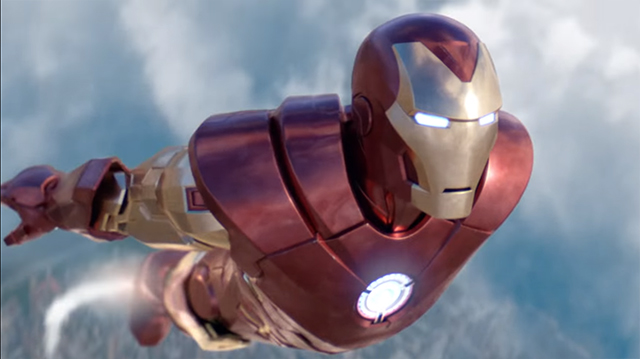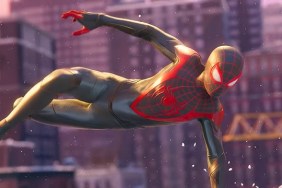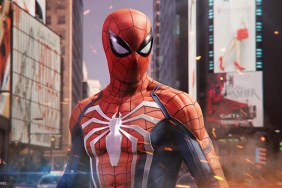Spider-Man PS4 helped kick off Marvel’s alleged desire to make quality video games again. While Square’s mysterious Avengers title is still trapped in the Soul Stone, Iron Man VR was the first game to be announced since Insomniac’s web-slinging Game of the Year candidate. Iron Man VR, even though it impressed us, has a lot riding on it as well as a stigma attached to it. But that isn’t something director and Camouflaj founder Ryan Payton is afraid of. He recently sat down with us at a PSVR preview event and conveyed his confidence in the game as well as how the idea came to be, its relation to Spider-Man PS4, how making Metal Gear Solid 4 and Halo 4 helped him, and more.
GameRevolution: How did Iron Man VR come to fruition? It’s an odd combination.
Ryan Payton: We’ve definitely taken a wayward path to becoming the developers of Iron Man VR and I have a lot of people to thank. One of those is one of my best friends in the whole world and his name is Bryan Intihar. He and I used to be on journalism side together at EGM and 1UP and have been friends since then.
It was the 2016 E3 and they had announced Spider-Man and that night we were in the JW Marriott in downtown LA and that’s where all biz dev happens. I was sitting there celebrating with Bryan and Jay Ong, who’s the head or Marvel Games, shows up and he’s like “Hey Bryan, good job.” And Bryan introduced me to Jay and Jay said “Well, I’m looking for a developer for some Marvel VR titles. Are you interested?” And I said, “Absolutely.”
Long story short, we pitched on Iron Man VR because there was no better pairing of Marvel IP and Marvel characters in VR than Iron Man. Iron Man and VR are the perfect match. They gave us two thumbs up and loved our prototype. The prototype was really focused on feeling like Iron Man and, in particular, nailing flying and making sure it felt really natural. Pairing the PlayStation Move controllers with your propulsors and not only for your propulsor jets so you can fly around in full 360 but also so you can shoot out of your palms like you would as Iron Man.
And then finally the HUD. The helmet is an analog for the HUD. So it was really the shooting, the flying, and the HUD all pairing perfectly together with VR so that’s where we got our game started.
GR: Insomniac said that it basically had free reign to pick whatever Marvel character it wanted. Did you also have that freedom?
RP: From the very beginning of talking to Marvel Games, we basically told them how much we wanted to work on an Iron Man game so that’s where started the conversation.
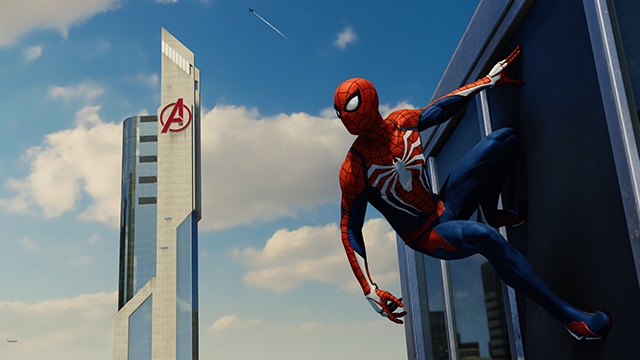
GR: With the Avengers Tower being in the Spider-Man game and Sony publishing both titles, it’s easy to assume that they take place in the same universe. So are they both in the same universe?
RP: From the beginning of development, we were saying that we wanted to make an original story so we didn’t necessarily build it out of what the other games were doing. But there are definitely opportunities to link the worlds. We’re not sure if we are going to do that just yet. That’s more of a Marvel Games decision than it is mine. But everyone at Camouflaj is a huge fan of PlayStation and Marvel and what the Insomniac guys did with Spider-Man so I’m hoping at the very least we can have a couple nods to that game just as fans.
GR: Spider-Man was the frontrunner of Marvel’s big, serious push towards making great games. Is this part of that push?
RP: Absolutely. So the team at Marvel Games run by Jay Ong along with Mike Jones and Bill Rosemann and Eric Monacelli is all about pairing their incredible IP with incredible games. And that’s one of the things that has always been fun about working with those guys from the very beginning: they think big, they want high quality, they want to compete against not only other comic book-based games but all games in general.
And that’s music to my ears because if you look at my career and all the other games that I’ve had the honor to be able to work on, those are big, ambitious games. It’s an area that I feel more comfortable with. And so the challenge of Iron Man VR is immense and I’ve definitely had sleepless nights thinking about the challenge that we’ve taken on. It’s such an incredible honor too because the IP is so awesome, the character is so great, and the matching with VR is an incredible opportunity that very few developers would ever have. I feel very lucky and fortunate to have this game that we can work on.
GR: When you put it like that, there aren’t many other Marvel properties that would transfer as well to VR which is like how Insomniac’s studio culture matches Spider-Man‘s essence. But flying around as Iron Man sounds like it could be nauseating, but it surprisingly wasn’t. How did you achieve that and make sure people are throwing up while playing?
RP: If you were talking to me two and a half years ago, I was really worried about how people would play and respond to the game like if they’d feel woozy or sick or motion sickness. Now that we are over two years into development, it’s the least of my concerns because the team has done such an incredible job of learning all the different things that are different pitfalls for VR development. We focused on all of the areas where we can make the game as comfortable as possible.
Knock on wood, but we don’t have any instances now of people getting sick. The only instances where we have trouble is if people have a fear of heights. We can’t help them get over that with the game since you’re flying around at 250 miles per hour like Iron Man, which is the fantasy of the game.
Part of our initial pitch for the game and something we’ve believed over the past two and a half years of making this game has been from the beginning that Iron Man VR is not an experimental VR game. We’re are going to build on the lessons learned from other VR games before us and build on the shoulders of giants. We’ve played hundreds of VR games and saw that these guys are doing this one thing and that’s really interesting [along with saying] let’s avoid this pitfall of this VR game.
Because what I think people want now from PSVR in particular is that they want fuller games and not experiments or little demos. With Iron Man VR, it’s not only about having that first-person action full 360 flight gameplay but also full first-person Tony Stark moments like an actual story that’s deep and compelling and true to the character and having those two elements combine into a proper campaign.
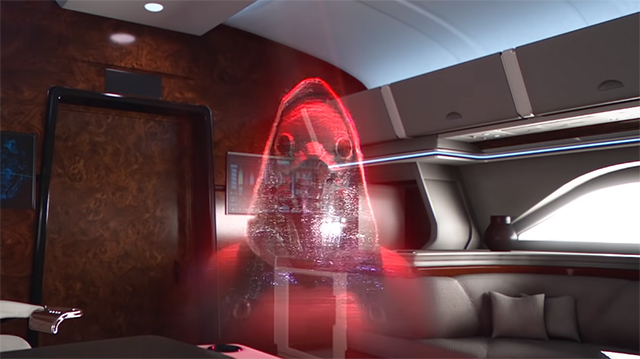
GR: So that was Ghost in the trailer. How does she factor in and what is the general story?
RP: From very early on, we knew that this was going to be an original Iron Man story. It’s not a story from the films or comics, although we obviously take a lot of inspiration from those. We wanted to create a really original story with Iron Man VR that focuses on an Iron Man who is a few years of into his career of being Iron Man so it’s not an origin story, per se. So there’s enough history and backstory where he has created enough enemies so we can have interesting moments.
Like Ghost, who is our big villain in the game. An interesting point about Ghost in particular as you know from the comics, that Ghost has always been a male. And even in the 1970s, we were looking at comics and looking at villains and Mike Jones and Bill Rosemann suggested that Ghost would be a really good villain for our game based on the themes we were exploring. And early on, we basically determined that we wanted to have proper representation of females in our game and so we had this radical idea that we were going to make Ghost a woman.
And it was so cool and Marvel Games was all behind it and we were all behind it and then we sat down to see the first trailer for Ant-Man and the Wasp and we see that Ghost was also a female in that. So clearly the Marvel Studios guys had the same inkling, which was all good. We were super happy to see that maybe we know what we’re doing. It was an encouragement for the team. We were a little disappointed because we wanted to be the first ones to make Ghost a woman but we were also encouraged to see that it seemed like we were on the right track.
Click to the next page to read hints on how the game’s upgrades will work, why its mechanics give it depth, and how working on Metal Gear Solid 4 and Halo 4 prepared Payton for Iron Man VR.
GR: This game is intuitive but it does have a learning curve. Can you speak more about the mechanics and making something that players have to adjust to?
RP: The core of the game has always been about mapping the full 360 and going wherever you want to go, flying naturally to the Move controllers and really letting the player and the fantasy of Iron Man lead the design. In other words, what we don’t want to do is design a game where we were teaching the player how to be Iron Man. It’s more about the player knows what Iron Man does and we give them the tools to be Iron Man. That, to me, has always been a different way of thinking about design.
One of the interesting things and interesting challenges about developing for VR is that the movements of VR are a lot more immersive and intuitive. So if players think that they can, for example, chop a watermelon this way, then you have to support them in doing that as opposed you coming up with a different mechanic. To me, that’s been one of the greater challenges of building the game but I think the team has done a really good job of making sure the flying feels like you’re Iron Man and the shooting is exactly how you imagined Iron Man to do it.
And just like in the original film, there is a learning curve. Tony Stark wasn’t always really good at flying. But now, and it’s a problem that most game developers have, our team is so good at the game that you watch them play, it’s like we have a lot of Iron Men in the office. But we are really excited to see what players do once they have time under their belt because I think there’s gonna be some crazy speedruns and maneuvers that we haven’t even really seen yet.
GR: Yes, I felt like that I was just starting to feel more of a mastery right near the end of the demo. It did appear as though there was some depth I wasn’t exploring there.
RP: Yeah and one of the things we are going to do with the full game will be optional missions. And optional missions are going to be our opportunity to really test the player. Because internally, we create these just for fun. Like what would it be like if you have this course with enemies on them or different timing challenges? That’s not going to be for everybody but it’s really fun to people fully embrace that Iron Man fantasy and try to do some crazy things because that’s what Tony Stark would do anyway.
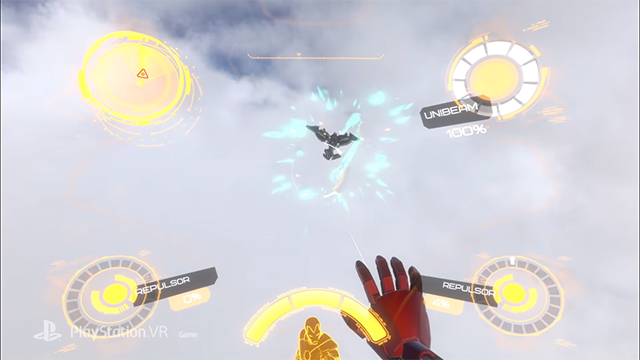
GR: Speaking of the Tony Stark fantasy, he’s known to get more upgrades as he progresses, which is shown well in the Marvel films. Is that sense of constantly upgrading going to carry over to the game?
RP: As you could imagine, when we sat down and said, “OK if we are making the ultimate Iron Man experience, what needs to be part of that experience?” And so obviously, being able to customize your suit is a core element of the game.
Progression is a big part of the game as well. The weapons that you’re going to have available to you are not just the repulsors. We have a whole variety of repulsors that we will be showing off at a later date but we also have more ballistic-heavy weapons as well, which I am super excited to show off how we are doing it. The way the mechanic works is such a great idea. Some sleuthy people online have already noticed that some of the screen shots have “Unibeam” written on them in the HUD. So we do have a larger weapons like the Unibeam and other stuff we aren’t ready to talk about just yet. That stuff is coming.
GR: You didn’t want to this be a VR demo. How do you make it a full game?
RP: Very early on in development when we first started talking to Marvel about making Iron Man VR, it was all about how Iron Man in VR is a perfect pairing and let’s not do something experimental. Let’s do a real game that’s exclusive to PSVR. That’s where we started. So we didn’t start small and get big. We started with big ideas. With the IP comes a lot of responsibility.
GR: That’s what Uncle Ben said, right?
RP: [laughs] Yeah, to quote Uncle Ben. So we feel the immense pressure that we should as developers of Iron Man VR. But we know that when we look at the vision of the game and the feature set that we’re building towards, we really have a lot of confidence that this is going to be the Iron Man game that everyone has wanted to play.
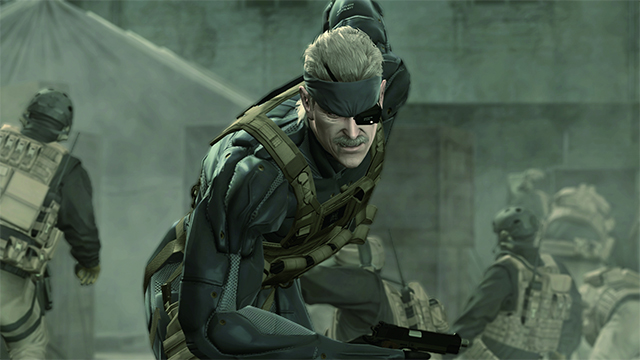
GR: So how was working on Metal Gear Solid 4? And did that experience help you make Iron Man VR?
RP: Metal Gear Solid 4 was my first real game from start to finish on the AAA scale. It was such an amazing proving ground because it was such an ambitious title. With every game, there are lots of challenges but with MGS4, we took on a lot of challenges: one being a system seller for PS3, our attempts to make the most beautiful game on PS3, and, at the time, be this farewell gift to the fans because it was supposed to be the final Metal Gear game. We crammed everything we could in the game as a way to end Solid Snake’s story but also to answer all the fans’ questions, which now, looking back, may or may not have been a good idea. But at the time, I think our hearts were in the right place.
So just like Iron Man VR, it was an incredible honor to be able to work on MGS4 and I think about that development every day. I look back at that development every single day.
GR: It was a big IP that was partially on your shoulders as was Halo 4. Was that where you learned the ability to undertake that sort of pressure?
RP: I’m a big Dark Souls players so I like challenges and I like to take the hard path in life. So definitely getting the job at Konami was tough. Shipping MGS4 was incredibly tough. Being creative director on Halo 4 was incredibly tough. Talk about challenges and pressure!
And then starting my own company, Camouflaj, with just myself and one, two, or three people. Now, if you include contracts, we have over 65 people and taking on a big project like Iron Man VR. So I’m no stranger to pressure. I’m not averse to stress. At the end of the day, your value as a game creator comes down to whether you can ship quality content. We have great partners with Sony and Marvel and they are very supportive and want what’s best for this game and for Camouflaj. I feel like we are good hands.
I’m so thrilled that people can actually play Iron Man VR today. Because our confidence level in the game has always been very high because people would play the game and say, “Crap, I feel like Iron Man. This is awesome.” And so we always fell back on the game so we are grounded by the game. The actual gameplay and experience is such a solid foundation to work from. With this game in particular, I haven’t had to worry as much as I have in the past because we have such confidence in what we are building.
